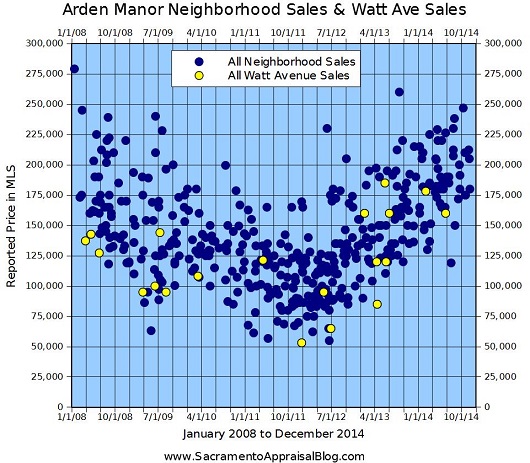My appraisal was 20% higher than the other appraiser. That’s what the attorney told me after I sent in my report. My first thought was, “Wow, I’m surprised”, and my second thought was, “Yikes, I hope I didn’t get it too high.” Long story short, the reason why there was such a huge disparity in value came down to comp selection. I chose properties that made reasonable sense for the subject, and the other appraiser chose homes that on paper looked like they could be the right ones, but in the end they were too low.

How can value be so far off? Well, let’s take a quick look at this situation and consider some key points for choosing comps. Even if you aren’t from the Sacramento area, what do you notice about my comps and his comps? (Note: I removed addresses and moved the subject property icon slightly to obscure its location).

The Comps – Explaining why there was a 20% difference in value:
- Closer to Main Street: The other appraiser chose sales that were either on a busy street (Lincoln Ave) or closer to a main street (Fair Oaks Blvd). Of course it’s fine if sales with a busy location are used, but we have to consider if a value adjustment ought to be given.
- Court Location: This is a key point. If you look closely, two of the other appraiser’s “comps” are located in court-type streets off Fair Oaks Blvd. These “court” locations are subject to increased traffic noise from the main street, but they also don’t have the same feel as the subject street. The court location basically has only one street of homes instead of multiple walkable streets with a more traditional neighborhood feel. We have to consider if there is a value difference here instead of blindly calling these locations similar.
- One-Mile Radius: The appraiser’s sales are located within a one-mile radius, but that doesn’t mean they are reasonable for use. Just because a sale is within a mile doesn’t mean it’s automatically a “comp” (key point). After all, there is a difference between a “sale” and a “comp”.
- Older vs. Newer: Just because it’s a newer sale doesn’t mean it’s the best “comp”. Fresh sales are ideal, but sometimes older sales are more relevant – especially if they are in the immediate neighborhood and require less adjustments than new stuff that’s really less similar (I’m not saying we should pass up new lower-priced “comps” for older higher sales). In this case the other appraiser chose newer sales that were less similar instead of older more similar sales. The irony was there was an older similar property that closed 2.5 years ago on the subject street for 5% higher than the other appraiser’s current value. Since the market has increased in value over these past years, this one sale alone could have been a tell the appraised value was simply too low.
- Deep Study: It’s easy to value something in a tract subdivision with model match sales galore, but it can be tricky when working in an area where values differ tremendously from street to street. This is why it’s critical to dig deeply to find how the market really views the subject street and property. I recommend finding sales on the subject’s street (even if they’re older) and asking yourself how these homes compared to the rest of the market at the time of their sale. What sold at a similar level? This type of research helps us see the context of how the subject street might fit in the overall picture of value. Also, if the subject sold in the past (and it was a legit sale), how did it compete with other sales at the time? What did it really compare to? That might also give us clues into the market. The truth is we might need to look through years of sales in the immediate neighborhood and spend multiple hours crunching numbers and scribbling notes so we get a sense of the context of value. If you’ve only struggled for 15-30 minutes, chances are you need to keep looking and continue to make comparisons and seek out advice until you get a good sense of how value tends to work on the subject street and in the immediate area. Otherwise it’s easy to pick nearby sales and call them similar even though they might trend much differently.
I hope that was helpful. Please know my goal isn’t to say my appraisal was perfect (there is no such thing) or to throw another appraiser under the bus. I love my colleagues. In this case there was a clear value difference and frankly the other appraisal just wasn’t reasonable.
 Blogging Class: This Thursday I’m teaching a class on effective real estate blogging at SAR from 9-11am. I’d love to have you come out. We’ll have two hours to talk shop and I really hope to give you ideas and empower you to go get it when it comes to blogging. Sign up online here.
Blogging Class: This Thursday I’m teaching a class on effective real estate blogging at SAR from 9-11am. I’d love to have you come out. We’ll have two hours to talk shop and I really hope to give you ideas and empower you to go get it when it comes to blogging. Sign up online here.
Questions: What do you see about the comps above? Any other tips for choosing comps? Anything I missed? I’d love to hear your take.
If you liked this post, subscribe by email (or RSS). Thanks for being here.



